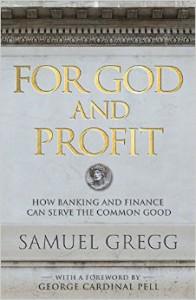 Benedikt Koehler, writing for Reaction, recently reviewed Samuel Gregg’s latest, For God and Profit. Koehler is an author whose books and articles focus on the history of economic thought. He starts the review by offering some background on why Gregg’s book is so important, citing events like the financial crisis of 2008 and some of Pope Francis’ critiques of capitalism. Then Koehler begins to dig into some of the details of Gregg’s book:
Benedikt Koehler, writing for Reaction, recently reviewed Samuel Gregg’s latest, For God and Profit. Koehler is an author whose books and articles focus on the history of economic thought. He starts the review by offering some background on why Gregg’s book is so important, citing events like the financial crisis of 2008 and some of Pope Francis’ critiques of capitalism. Then Koehler begins to dig into some of the details of Gregg’s book:
The book comes in two halves. The first sets out what Christianity in the Middle Ages had to say about business. That period is instructive because it was a time when whatever the church said about anything shaped the way society looked at things. In the second half of the book Gregg sets out a Christian stance for resolving a host of topical financial issues.
The medieval historical background matters because of misconceptions that need clearing up. Some hold Christianity imposed restrictions on banking which stifled entrepreneurship, and worse, the church blocked economic innovation by encouraging the faithful to strive for happiness in the next world rather than in this one. Both claims, for Gregg, are urban myths. True, the church banned usury, and indeed, it took time for the realization to emerge that charging interest is not always tantamount to usury. But investing in government bonds became legitimate long before the Reformation. And likewise, regarding property rights, Thomas Aquinas (and others) pointed out that although Jesus undeniably did not place much store on accumulating goods, in a world where nobody had responsibility for tending to property nobody would do any work at all and we would end up in a wholesome mess. (Admittedly, these were not the very words Aquinas used in his Summa theologiae. But that is what they amount to.)
The bottom line of Christian economics is that Christianity is pro-profit and pro-property.
Gregg turns to show how that applies to a range of flash points in public debates about finance. One area in contention is a Christian perspective on public finance. It is one of Gregg’s finds that from the seventeenth century onward, the very moment state involvement in the economy reached its inflection point and took off, Christian contributions to economics, surprisingly, began to fade away. In fact, most of what the church has had to say about public finance was already spelled out in the Middle Ages: governments should ban monopolies and ensure the purchasing power of money remains stable. Gregg’s book is peppered with observations on the right conduct of government finance which for the most part issue from theologians of the medieval period. After the Middle Ages the topic fell off the theological radar until the nineteenth century, when the church staked out its position on labour relations, and then when in the 1950s Pope Pius XI declared finance as the “crossroads [] of capital, labour, and ideas.”
You can read Koehler’s full review of For God and Profit here.

